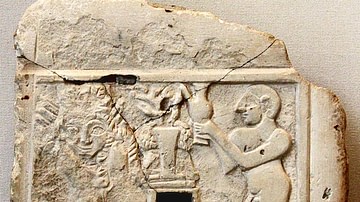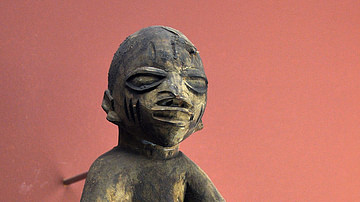Search
Did you mean: Delos?
Search Results

Definition
Charon - The Ferryman to the Dead in Greek Mythology
Charon is a figure from Greek mythology where he is the boatman who ferries the souls of the dead across the waters of Hades to the judgement which will determine their final resting place. The Greeks believed the dead needed a coin to pay...

Definition
St. Anthony's Fire
St. Anthony's Fire (SAF) is an illness brought on by the ingestion of fungus-contaminated rye grain causing ergot poisoning (ergotism). The disease's common name derives from the medieval Benedictine monks dedicated to that saint who offered...

Definition
Ninhursag
Ninhursag (also Ninhursaga) is the Sumerian Mother Goddess and one of the oldest and most important in the Mesopotamian Pantheon. She is known as the Mother of the Gods and Mother of Men for her part in creating both divine and mortal entities...

Definition
The Gospels
The New Testament contains four gospels attributed to Matthew, Mark, Luke, and John. The four gospels are not biographies of Jesus, nor are they history as we define it. What each gospel attempted to do was write a theological explanation...

Definition
Angkor Wat
Angkor Wat is a temple complex in the province of Siem Reap, Cambodia originally dedicated to the Hindu god Vishnu in the 12th century CE. It is among the largest religious buildings ever created, second only to the Temple of Karnak at Thebes...

Definition
Orisha
Orisha (also given as Orisa and Orishas) are supernatural entities usually referred to as deities in the Yoruba religion of West Africa, though they are actually emanations or avatars of the supreme being Olodumare. Their number is usually...

Definition
Trephination
Trephination (also known as trepanning or burr holing) is a surgical intervention where a hole is drilled, incised or scraped into the skull using simple surgical tools. In drilling into the skull and removing a piece of the bone, the dura...

Definition
Utu-Shamash
Utu (also known as Shamash, Samas, and Babbar) is the Sumerian god of the sun and divine justice. He is the son of the moon god Nanna and the fertility goddess Ningal in the Sumerian tradition but was known as Shamash (Samas) to the Akkadians...

Definition
Anahita
Anahita is the ancient Persian goddess of fertility, water, health and healing, and wisdom. Owing to her association with life-giving properties, she also came to be connected with ancient Persian warfare as soldiers would pray to her for...

Definition
Bartolomé de Las Casas
Bartolomé de Las Casas (1484-1566) was a Spanish Dominican friar and former conquistador who revealed the atrocities of the conquests of New Spain and Peru and who strove to protect the basic rights of indigenous peoples in the Spanish Empire...